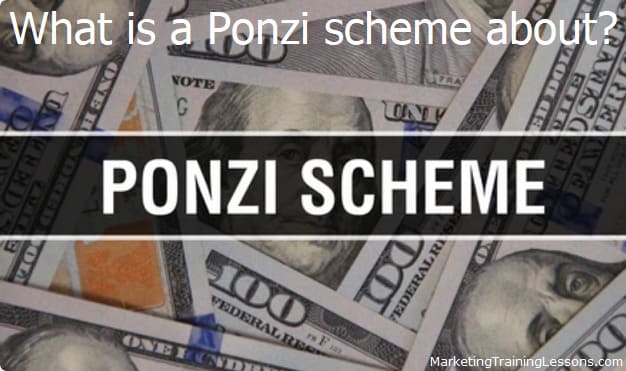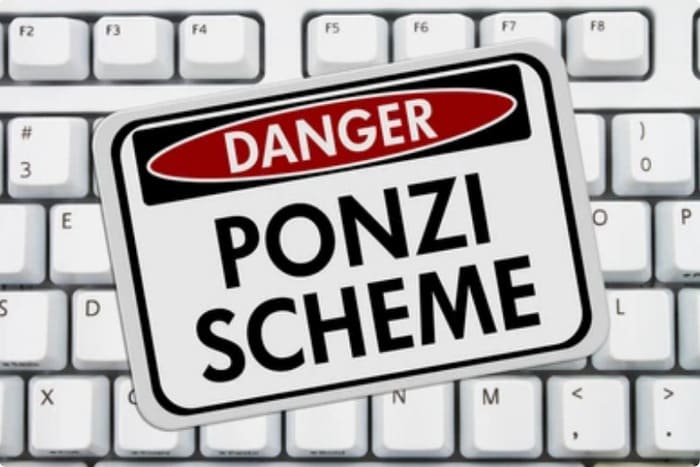What Is A Ponzi Scheme About

Protecting Yourself Against Ponzi Schemes: Tips for Identifying Red Flags and Avoiding Financial Fraud
Welcome by this article where we’ll explain What is a ponzi scheme about.
Are you tired of falling prey to financial frauds and Ponzi schemes? Have you ever wondered how to protect yourself against these scams that can leave your pockets empty and your bank accounts drained?
Well, worry no more! In this blog post, we will share with you some valuable tips on how to identify red flags. This will prevent you from becoming a victim of Ponzi schemes.
You might be an experienced investor or just starting out in the world of finance. With these practical insights you will stay alert and make informed decisions about your money.
So buckle up and get ready to find out what is a ponzi scheme about and to safeguard yourself against financial fraud!
Click here for my #1 recommendation for making money online and working from home
Introduction to Ponzi Schemes
A Ponzi scheme is a fraudulent investment operation where the operator generates returns for early investors by using money from new investors.
Ponzi schemes are named after Charles Ponzi, who became notorious for using the scheme in the 1920s. This scheme will claim to have a real, legit way to make money.
People will usually fall for this kind of scams because they think it’s working. They then have to find new people and introduce them to the system, as they can earn more money for inviting new members.
The owner of the Ponzi scheme will pay some money to the investors, making it look like it’s a legit system, but they keep money behind. That is how they make money with the scheme.
Ponzi schemes typically involve promising investors high returns with little or no risk at all. For example, an operator might promise to double an investor’s money in just a short period of time.
To recruit new investors, the operator may use false testimonials from other supposed investors or may pay early investors “dividends” from money paid by later investors.
The key to a Ponzi scheme is that there is no legitimate underlying investment activity generating the returns being promised to investors.
Instead, the operator uses new investor funds to pay dividends and meet redemptions requested by earlier investors.
This type of fraud can continue for a long time before it eventually collapses. This happens when there is not enough new money coming in to keep up with the payments being made to earlier investors.
Ponzi schemes are often difficult to identify because they can appear to be legitimate investment opportunities offering high returns with little or no risk.
However, some red flags can indicate that an investment may be part of a Ponzi scheme:
High rates of return with little or no risk: Be wary of investments promising very high rates of return with little or no risk. If it sounds too good to be true, it probably is!
What is a Ponzi Scheme About?
Here you will find an answer to the question What is a ponzi scheme about? A Ponzi scheme is a type of financial fraud that involves promising investors high returns in exchange for their investment.
However, the fraudster doesn’t use the money to generate the promised returns. He simply uses new investor money to pay existing investors, giving the appearance of profitability.
Eventually, the scheme collapses when there are not enough new investors to keep up with the payments.
Ponzi schemes can be a very lucrative business for the fraudster, but they are also very risky. Investors who are getting involved in a Ponzi scheme can lose all of their investment.
There are several red flags that can indicate that a investment opportunity may be a Ponzi scheme. For example, if an investment promises unusually high returns with little or no risk, it may be too good to be true.
Additionally, if an investment requires you to recruit other investors in order to make money, it may also be a sign of a Ponzi scheme.
If you are considering investing in an opportunity, make sure to do your research. Talk to a financial advisor to ensure that it is legitimate before handing over any money.
Click here for my #1 recommendation for making money online and working from home
Identifying Common Red Flags of Ponzi Schemes
When it comes to avoiding financial fraud, there are few things more important than being able to identify the red flags of a Ponzi scheme.
Unfortunately, these schemes can be quite sophisticated and difficult to spot. That is why it’s important to be aware of the most common warning signs.
One of the first warning signs to look out for is an investment that seems too good to be true. If someone is promising guaranteed or exceptionally high returns with little or no risk, it’s likely that they’re running a Ponzi scheme.
It’s also important to be wary of investments that require you to recruit new investors in order to earn a return. This is usually a key component of many Ponzi schemes. Another red flag to watch out for is sudden and unexpected changes in an investment strategy.
Your investment advisor might suddenly starts pushing you to invest in something new or different, without any good explanation. This could be a sign that they’re trying to cover up losses from a Ponzi scheme.
Be especially suspicious if you’re pressured to cash out your investments quickly. The same goes if you are told not to tell anyone about the investment.
If you think you are being scammed, it’s important to act quickly and get professional help. Don’t let yourself taken advantage of by a Ponzi scheme – know the red flags and stay alert for them.
How to Avoid Becoming a Victim of Financial Fraud
There are a few key things to watch out for to avoid becoming a victim of financial fraud. This is especially important when it comes to Ponzi schemes.
First, be aware of the most common warning signs associated with these types of scams. These can include promises of high returns with little or no risk, pressure to invest quickly, and complex or secretive investment strategies.
If you’re considering investing in something that sounds too good to be true, be sure to do your research and ask questions. Get all the information you can about the investment opportunity and the people behind it before making any decisions.
If you’re ever feeling pressured to make an investment on the spot, walk away! Take some time to think about it before moving forward.
Finally, remember that if something seems too good to be true, it probably is. When it comes to investing your hard-earned money, it’s always better to stay on the safe side.
If you have any doubts or concerns about an investment opportunity, don’t hesitate to reach out to a trusted financial advisor for help.
Click here for my #1 recommendation for making money online and working from home
Tips for Protecting Your Assets and Investments
When it comes to protecting your assets and investments, there are a few key things to keep in mind. First and foremost, be sure to do your research before investing in anything.
If something sounds too good to be true, it probably is. Be wary of promises of high returns with little or no risk. And beware of anyone who asks you to keep your investment a secret.
Another important tip is to diversify your investments. Don’t put all your eggs in one basket. This will help protect you if one investment goes sour.
Finally, pay attention to red flags that may indicate a Ponzi scheme. These can include pressure to invest money quickly, guaranteed returns, vague or confusing information, and avoiding questions.
If you see any of these red flags, be sure to do more research before investing any money.
Alternatives to Investing in Ponzi Schemes
There are a number of alternative investments that are far less risky than investing in Ponzi schemes. Some safe alternatives include:
– Investing in low-risk bonds or other fixed-income securities
– Putting money into a savings account or CD at a bank or credit union
– Buying gold or silver bullion
– Investing in mutual funds or exchange-traded funds (ETFs) that track a broad market index
Each of these alternatives has its own risks and rewards, but they are all considerably less risky than investing in a Ponzi scheme. You should always consult with a financial advisor to determine what investment options are right for you.
Click here for my #1 recommendation for making money online and working from home
Conclusion
Now you know What is a ponzi scheme about. Don’t expect ponzi schemes to stop. As long as people can make easy money by scamming others, it will keep going on.
Protecting yourself against Ponzi schemes is essential in today’s world. Know about the warning signs associated with these types of scams. Take measures to protect your financial information, to avoid becoming a victim.
Educating yourself about financial fraud and knowing what to look for will go a long way. This will protect you from any potential and financial harm.
Taking the necessary precautions now can help ensure that you have peace of mind when it comes to protecting your finances.
Thanks for reading this article about What is a ponzi scheme about? If you want to make real money online, then follow this link.


